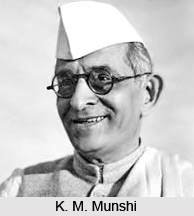 Besides being a politician and educationist, K M Munshi was also an environmentalist. He initiated the Van Mahotsav in 1950, when he was Union Minister of Agriculture and Food, to increase the area under forest cover. Since then Van Mahotsav a week long festival of tree plantation is organised every year in the month of July all across the country and lakhs of trees are planted.Munshi was also litterateur with a wide range of interests.
Besides being a politician and educationist, K M Munshi was also an environmentalist. He initiated the Van Mahotsav in 1950, when he was Union Minister of Agriculture and Food, to increase the area under forest cover. Since then Van Mahotsav a week long festival of tree plantation is organised every year in the month of July all across the country and lakhs of trees are planted.Munshi was also litterateur with a wide range of interests.
He has enriched genres like the novels, short stories, biographies and autobiography. Munshi is specially known for his historical novels in Gujarati. His trilogy Patanni Prabhuta (The Greatness of Patan), Gujaratno Nath (The Ruler of Gujarat) and Rajadhiraj (The Emperor) is considered significant in the literature of Gujarat. His other works include Jay Somnath, Krishnavatara and Bhagavan Parasurama.



















